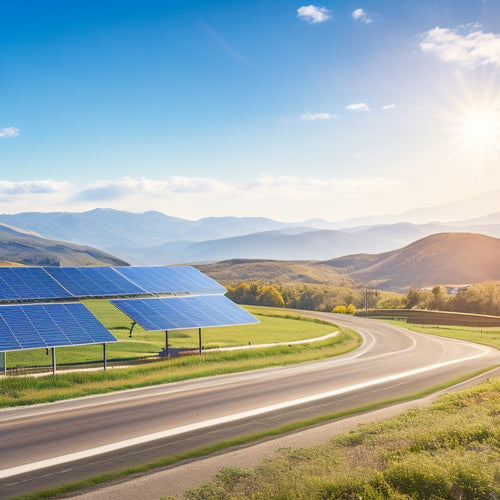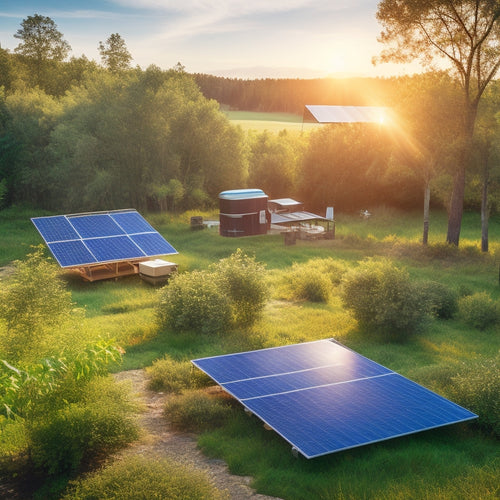
Cost to Set up Solar Panels
Share
You can expect to pay between $15,000 and $30,000 to set up solar panels, but this initial investment can lead to significant long-term savings on your energy bills. With average annual savings ranging from $400 to $1,000, you'll start seeing a return on your investment quickly. Additionally, solar panels can increase your home's value by up to 17% and even sell for a higher price in the future. To get the most out of your system, it's crucial to evaluate factors like inverter efficiency, roof shading, and government incentives. As you assess solar panels, you'll want to investigate these details further to maximize your energy independence and savings.
The Essentials
- The initial investment in solar panels can be offset by long-term savings, with average annual energy bill savings ranging from $400 to $1,000.
- The cost of setting up solar panels can be reduced by the Federal Solar Investment Tax Credit, which provides a 26% tax credit on the total system cost.
- The overall cost of solar panels depends on system size, energy usage, and local electricity rates, with higher savings correlating to higher property value increases.
- High-efficiency inverters, with ratings above 95%, are crucial for reliable renewable energy sources and can minimize energy loss during installation.
- Professional guidance is essential for selecting compatible inverters and evaluating roof shading patterns to ensure maximum energy output from solar panels.
Save Money on Bills
You'll start saving money on your energy bills as soon as your solar panel system is installed.
By generating your own electricity, you'll lower your expenses and reduce your energy costs.
With Renewable Energy Solutions like solar power and battery storage, you can break free from reliance on the grid and reduce your electricity bills.
Over time, these savings can add up to a significant amount, helping to offset the initial cost of setting up your solar panels.
Lower Your Expenses
Switching to solar power can pay off in the long run, as it allows you to tap into a free and renewable energy source.
With Renewable Energy Systems, you can reduce your reliance on the grid and minimize your carbon footprint.
While there's an initial investment required to set up solar panels, you'll start seeing long-term savings on your energy bills soon after.
The amount you save depends on several factors, including the size of your solar panel system, your energy usage, and the local electricity rates.
On average, homeowners who invest in solar panels can save between $400 and $1,000 per year on their energy bills.
Reduce Energy Costs
Reduce Energy Costs (Save Money on Bills)
With solar panels installed, your energy bills will decrease considerably, thanks to the free energy generated from the sun. You'll be utilizing renewable resources, reducing your reliance on traditional energy providers, and taking a significant step towards energy independence.
By switching to solar power generation systems, you'll not only reduce your energy costs but also contribute to a sustainable future by minimizing reliance on fossil fuels and reducing greenhouse gas emissions solar energy solutions. As you generate your own electricity, you'll be offsetting your energy consumption, thereby slashing your utility bills. The amount you save will depend on factors such as your energy usage, panel efficiency, and local electricity rates. However, on average, homeowners can save anywhere from $400 to $1,000 per year.
Moreover, with solar panels, you'll be protecting yourself from rising energy costs. Traditional energy sources are finite, and as demand increases, prices will likely skyrocket.
Boosts Property Value Fast
You'll see a significant increase in your home's equity with the installation of solar panels, which can be a major selling point if you decide to put your property on the market.
In fact, studies have shown that solar panels can enhance your home's value by up to 17%, which can translate to a higher selling price.
By switching to renewable energy, you'll not only increase your property value but also reduce your reliance on traditional energy sources.
This means you'll be able to recoup a significant portion of your initial investment, making solar panels a smart financial move.
Increased Home Equity
Installing solar panels can enhance your property value by up to 17% as they greatly increase your home's equity. This significant increase is due to the perceived value of having a renewable energy source, which appeals to environmentally conscious homebuyers.
As you invest in solar panels, you're not only reducing your reliance on the grid but also making a smart home improvement that pays off in the long run.
In fact, studies have shown that for every dollar you save on energy costs, your property value increases by around $20. This means that if you're saving $500 per year on electricity, your home's value could increase by $10,000.
That's a substantial return on investment, making solar panels a savvy financial move. By going solar, you're not only reducing your carbon footprint but also increasing your home's equity, giving you more freedom and flexibility in the future.
Higher Selling Price
With the solar panel installation, your property's selling price gets a significant enhancement, as eco-conscious buyers are willing to pay a premium for homes with renewable energy systems.
This increased demand for sustainable living spaces is driving up property values, making your home more attractive to potential buyers. According to market trends, homes with solar panels can sell for up to 17% more than similar homes without them.
This means that if you're planning to sell your property in the future, you can expect a higher selling price thanks to your solar panel investment.
As the demand for eco-friendly homes continues to rise, you can capitalize on this trend by installing solar panels.
With the increased demand for sustainable living spaces, your property will stand out from the competition, giving you a competitive edge in the market.
Inverter Efficiency Matters Most
When you're setting up solar panels, you'll want to verify your inverter is optimized for peak power tracking, as it can greatly impact your system's overall energy yield.
For instance, a residential solar power system with a high-efficiency inverter can provide a reliable source of renewable energy and reduce your electricity bills.
You should also pay attention to the inverter's efficiency ratings, which can range from 90% to over 98%, depending on the model and manufacturer.
Peak Power Tracking
Your solar panel system's inverter plays an essential role in optimizing energy production, and peak power tracking is a key feature that secures maximum efficiency. This feature allows your inverter to automatically adjust its output to match the maximum power point of your solar panels, affirming peak power efficiency. By doing so, you'll get the most out of your solar panel system, even on days with varying weather conditions.
Peak power tracking is essential for solar panel optimization, as it assures that your system produces the maximum amount of energy possible. This feature is especially important during periods of partial shading, where some panels may not be producing at their maximum capacity. By tracking the maximum power point, your inverter can compensate for these losses, resulting in increased energy production.
When selecting an inverter for your solar panel system, look for one with a high peak power tracking accuracy. This will guarantee that your system is operating at its maximum potential, providing you with the freedom to generate your own clean energy and reduce your reliance on the grid.
Efficiency Ratings Matter
The efficiency rating of your solar panel system's inverter is a critical factor in determining the overall performance of your setup. You'll want to choose an inverter with a high efficiency rating to guarantee you're getting the most out of your solar panel types.
Inverters with high efficiency ratings can convert more of the DC power generated by your solar panels into usable AC power for your home or business.
When selecting an inverter, look for models with efficiency ratings above 95%. This guarantees that only a minimal amount of energy is lost during the conversion process.
During the installation process, your solar panel professional will help you choose an inverter that's compatible with your system's specific needs.
Inverters with high efficiency ratings may come at a higher upfront cost, but they can lead to significant long-term savings. By maximizing your energy production, you'll reduce your reliance on the grid and enjoy greater freedom from utility bills.
With the right inverter, you can access the full potential of your solar panel system and enjoy the benefits of renewable energy.
Assess Your Roof's Shading
When evaluating your roof's shading, you'll need to take into account obstructions like skylights, vents, and chimneys that can cast shadows on your solar panels.
Additionally, it's crucial to reflect on the impact of surrounding trees and buildings on your solar panel's energy production, especially if you're planning to install an off-grid solar system.
You'll also need to analyze the shading patterns over time, considering the sun's movement throughout the day and year.
Roof Obstructions to Consider
Skim your roof for obstructions that could cast a shadow on your solar panels, reducing their energy output. Look for vents, skylights, chimneys, and dormer windows that could block sunlight and affect your solar panel system's performance.
Even small obstructions can make a big difference, so it's important to identify them early on.
Roof angles also play a significant role in determining the ideal placement of your solar panels. Steep roof angles can create installation challenges, making it difficult to secure the panels properly.
Additionally, complex rooflines with multiple angles and features can increase installation costs.
When evaluating your roof's shading, consider the location and size of obstructions, as well as the roof's orientation and angle.
A thorough evaluation will help you determine the best placement for your solar panels, ensuring maximum energy output and minimizing installation challenges.
Shading Patterns Over Time
As you stand outside your home, observing your roof's layout, consider how the surrounding environment affects the amount of sunlight it receives throughout the day.
Shading patterns over time play a significant role in determining the effectiveness of your solar panel system. A shading analysis is essential to identify areas of your roof that receive partial or full shade, which can impact energy production.
Seasonal variations also come into play, as the sun's position changes throughout the year. In the winter, the sun is lower in the sky, and shadows are longer, while in the summer, the sun is higher, and shadows are shorter.
You'll want to assess how trees, buildings, and other obstructions affect your roof's shading during different times of the year.
Government Incentives Available Now
You're likely aware that the cost of setting up solar panels can be considerable, but you may not know that you can offset some of these expenses with government incentives.
The federal government offers a Solar Investment Tax Credit (ITC), which allows you to claim a tax credit of 26% of the total cost of your solar panel system.
This credit can greatly reduce your tax liability, making solar energy a more affordable option for your home or business.
Solar Tax Credits
How much can you save with solar tax credits? As a homeowner or business owner, you're entitled to a notable reduction in your tax liability when you invest in solar energy.
The Solar Investment Tax Credit (ITC) allows you to claim a tax credit of 26% of the total cost of your solar panel system. This means you can subtract 26% of your solar panel installation cost from your federal income tax liability.
By taking advantage of solar tax credits, you can considerably reduce the upfront cost of going solar. This, combined with other solar financing options, makes solar energy a more accessible and affordable option for many.
The renewable energy benefits are undeniable - not only will you reduce your carbon footprint, but you'll also save money on your energy bills.
To claim your solar tax credit, you'll need to file Form 5695 with your tax return. Be sure to keep receipts and documentation for your solar panel installation, as you'll need to provide proof of purchase and installation.
With solar tax credits, you can enjoy the freedom to generate your own clean energy while saving money on your taxes.
Frequently Asked Questions
Can I Install Solar Panels on My Own?
You can attempt a DIY installation, but it's essential to prioritize solar panel safety; make sure you follow manufacturer guidelines, take necessary precautions, and consider local building codes to avoid electrical shock and fire hazards.
How Long Does It Take to Install Solar Panels?
You're curious about the installation timeline; typically, it takes 1-3 days for a residential installation process, but this varies depending on system size, complexity, and local permits, so be prepared to invest some time in getting your solar setup running.
Are Solar Panels Resistant to Hail and Extreme Weather?
You'll be relieved to know that solar panels are built to withstand harsh conditions, with a mere 0.05% chance of hail damage, and are designed to resist extreme weather, including category 3 hurricanes, ensuring your energy freedom remains uninterrupted.
Can I Use Solar Panels With My Existing Electrical System?
You can seamlessly integrate solar panels with your existing electrical system, ensuring solar panel compatibility, as long as you've got a compatible inverter and a licensed electrician to handle the electrical system integration, granting you energy independence.
Do Solar Panels Require Regular Cleaning and Maintenance?
You'll need to clean your solar panels regularly to maintain their efficiency, as dirt and debris can reduce energy output by up to 25%. Aim for a cleaning frequency of every 6-12 months, depending on your location and climate.
Final Thoughts
As you begin to utilize the sun's warm hug, remember that the cost to set up solar panels is a mere speed bump on the road to energy independence. With bills dwindling like autumn leaves, your property's value will bloom like a spring flower. By choosing the right inverter and evaluating your roof's shading, you'll bask in the warmth of government incentives, illuminating a bright financial future.
Related Posts
-

Is Switching to Green Energy Solutions Easy
Switching to green energy solutions isn't just easy; it's also beneficial. You can greatly cut utility costs and enjo...
-

Top Off Grid Solar Batteries for Renewable Energy
When seeking top off-grid solar batteries for renewable energy, consider options with advanced battery chemistry, suc...
-

Designing a Green Roof for Maximum Energy Efficiency
Designing a green roof for maximum energy efficiency involves several key strategies. Start by selecting native, drou...


